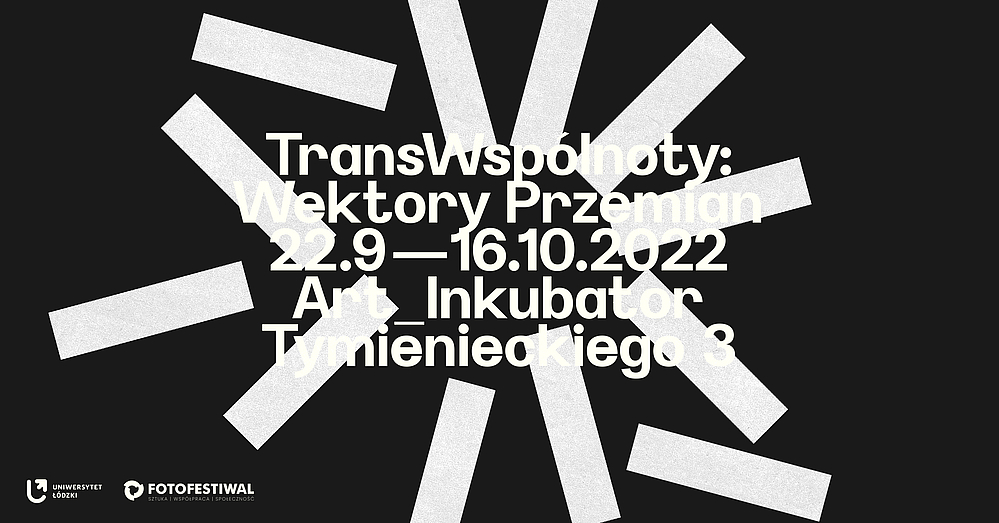TRANSCOMMUNITIES: VECTORS OF CHANGE

Curated by: Ryszard W. Kluszczyński, Ada Florentyna Pawlak
The opening of the exhibition TransCommunities: vectors of change, jointly organized by the University of Lodz and Fotofestiwal, will take place on Thursday (September 22). The event will begin with a discussions attended by five panelists with different interests and academic backgrounds who will introduce participants to the concept of community and how it can be understood. The exhibition will feature the works of 9 artists.The event will start at 6 pm.
The list of the panelists will include:
- prof. Ryszard Kluszczyński (curator, head of the Department of New Media and Digital Culture at the University of Lodz. His research interests include new media and digital culture, social media and contemporary art)
- dr Marcin Maria Bogusławski (assistant professor in the Department of Contemporary Philosophy at the University of Lodz. His interests include (post)humanism and (post)modernity and concepts of community)
- dr Joanna Miksa (assistant professor in the Department of Ethics at the University of Lodz. Her academic interests include, among other topics, ethics, including bioethics, and the community from the perspective of practical ethics)
The discussion will be moderated by:
- Ada Florentyna Pawlak (curator, lecturer at Institute of Ethnology and Cultural Anthropology at the University of Lodz and Trendwatching&Future Studies at AGH University of Science and Technology, speaker of the Digital University. She specializes in the area of social implications of artificial intelligence and transhumanism)
- dr Artur Modliński (assistant professor in the Department of Management at the University of Lodz. He explores human-machine interactions and the idea of community in the posthumanist understanding)
The panel will be followed by the exhibition opening (7 pm). The artists will present and discuss their works.
8.30–9.15 pm – visual show and DJ set by AV Soundscape Mirror collective
9.30–11.30 pm – afterparty and DJ set by Krzysztof Ostrowski aka Freeze
The exhibition focuses on the topics related to contemporary transformation in the perception of community, which artists touch upon more and more often. As he pondered on these issues, Giorgio Agamben once proclaimed the emergence of a community where every member will be a role model. In the face of ongoing hybridisation, leading to internal complexity and diversity, in the face of no shared characteristics around which communities used to gather, a new necessity surfaces to put a special emphasis on the bonds that tie together the members of the new community. Up until now, the communities’ hybrid character was caused by global migrations and the development of global tools of communication, as those communities were composed of humans.
Right now, aside from people, non-human and posthuman beings are becoming new members of comunities and at the same time factors changing the intra-community bonds.
What constitutes our sense of belonging, what is the basis of our identity? When it comes to the concept of “community”, its etymology is of key importance. Munus means a special kind of gift, related to making a commitment towards others. Being in a community means that an individual partially renounces themselves in favour of communis. For Robert Esposito, community is an opposite of the personal space of an individual, a concept in which the individual becomes lost and from which it must defend itself. Pursuing the Communitas and the immunitas are the processes that are conditioned by one another.

Contemporary vectors of changes demonstrate that the technoculture lacks balance in this sphere. In terms of thinking about environment, our body and its experiences, affections and sexuality, the technological construction of our “I” and “us” more and more frequently realises itself without our awareness of those processes. We experience quasi-participation which is so absorbing that direct participation in social rituals is no longer possible.
In social practices, it is important to co-exist in a cohabitated reality, share this reality. Modern hybrid worlds are not only human communities, but also many new constellations of other subjects that we are going to bond with. Among them, we can find a variety of non-human living begins and many posthuman, fabricated forms.
Technological corporations make promises about artificial worlds, where we will no longer feel lonely or unhappy, because virtual beings will welcome us and take care of us. This synthetic standby-for-something-else mode may in fact prove really attractive, especially in comparison with the indifference of real people.
In the process of transhumanisation of communities, we must remember that we inhabit the world in our bodies. Transgression and the need for bonding between different components of TransCommunities emerge as one of the most important challenges for the contemporary world.
Ryszard W. Kluszczyński, Ada Florentyna Pawlak

